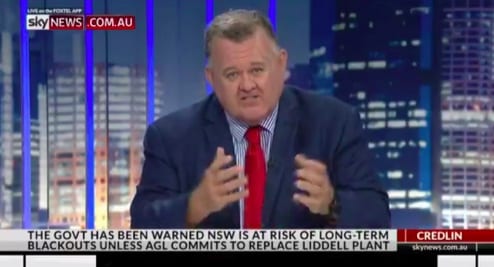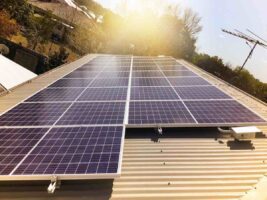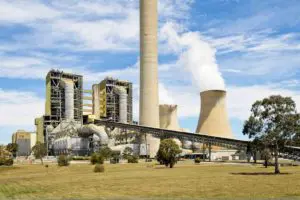John Monash could be spinning in his grave. The military leader and civil engineer hailed by Coalition government MPs and Senators as a great innovator of his time has had his name besmirched by a push to re-embrace the technology he thought was useful a century ago.
The fact that the Coalition MPs – more than half the back-bench according to some claims – have united under the banner of the Monash Forum, and eschew the very innovation he championed, says much of what you need to know about their intentions.
Still, the impact of this political ginger group is already having an impact. They have demanded Prime minister Malcolm Turnbull jump to their demands, and he has asked how high.
Almost immediately, Turnbull hopped on to the phone to the AGL chairman on Tuesday night imploring him to consider the sale of ageing Liddell generator to a Chinese-owned consortium.
Even Turnbull knows that it would be unconcionsionable to build a new coal-fired generator, but he is doing his best to keep as many of the existing ones open as long as he can.
That will not occur without government subsidies – in Liddell’s case the enormous expense of unravelling shared infrastructure with Bayswater, upgrading equipment and dealing with $1 billion environmental legacies.
The Coalition has now crashed headlong into its own ideology. The Forum’s manifesto, reprinted in full below, can be briefly summed up as “coal subsidies good, renewable subsidies or targets bad.”
“We’re not opposed to renewable energy provided it’s economic without grants or mandatory targets and provided it doesn’t prejudice the reliability of supply,” the manifesto says.
But the group is fully in favour of subsidies to coal plants – not just to keep current ones open, but also to build a new coal generator at the site of the shuttered Hazelwood plant, and more new coal generators at other locations.
“There may be other good sites for new, expanded or refurbished coal-fired power stations,” the manifesto says.
“There is a strong case for keeping NSW’s Liddell power station open beyond its current closure date of 2022, as the Turnbull government has recognised. But nothing is going to happen without government intervention, as AGL’s rebuff to the government over Liddell clearly indicates.”
And it cites the Turnbull government’s intervention into the market and the plan to spend $6 billion or more on Snowy 2.0. Why not Hazelwood 2.0, they ask.
Needless to say, there is not a single mention of climate or the environment, of the need to meet the Paris targets or recognise the pollution that come from particles emitted from coal plants.
And there is no mention either of the economics. Merely, a sweeping claim that coal was once cheap so it must still be cheap.
“Cheap power was once Australia’s chief comparative advantage in the manufacturing sector and we can’t abandon it if we are to remain a country that makes things. That’s why all Australian governments must overcome their current coal-phobia and ensure that coal-fired power stations continue to be built.”
But as the Finkel report, and any number of other studies have highlighted, new coal generation does not compete with wind and solar, nor even with wind and solar and storage. AGL’s own analysis shows that refurbished coal does not compete either.
And the people that do actually make things now realise that wind and solar provide the best opportunities to continue to do so in Australia.
This is true of the Whyalla steelworks, the Carlton and United Brewerie, Nectar Farms, Sun Metals, Telstra and any number of smaller businesses who are investing in rooftop solar in record numbers.me manufacturers are smart enough to see it.
Here is the Monash Manifesto:
The Monash Forum is named in honour of our greatest general who was also one of our greatest engineers. Sir John Monash is best remembered for his work as the commander of the Australian Army Corps in the Great War and his contribution to “all arms” warfare: coordinating infantry, artillery and armour to break the deadlock created by trenches, barbed wire and machine guns.
But he was also the man who brought reinforced concrete to Australia, the designer of some of Melbourne’s early bridges; and, post war, the man who turned the La Trobe Valley into an electrical powerhouse that made Victoria Australia’s industrial capital.
Our country today is more in need than ever of reliable, affordable electricity. That’s what Monash gave Australia in the 1920s and that’s what the Monash Forum wants to promote almost a century on.
We’re not opposed to renewable energy provided it’s economic without grants or mandatory targets and provided it doesn’t prejudice the reliability of supply. We accept that, in time, coupled with more efficient and larger scale batteries, renewable power is likely to form a bigger proportion of Australia’s power generation. But that time has not yet come, and we’re sceptical of any claims made for the viability of renewables that requires continued mandatory use or taxpayer grants.
As well, we want to see our country’s resources put to good use. For the best part of a century. Victoria’s vast reserves of brown coal have powered much of southern Australia and should continue to do so. The coal that we gladly export and that generates much of the electricity used in China, Japan, Korea, Taiwan and India should continue to generate power here too. If it’s right for other countries to use our coal, how can it be wrong for us to do so?
Yet the political risk caused by emissions reduction policies, especially the extreme ones implemented or proposed by the Labor Party, means that no private company is likely to build another coal-fired power station here in Australia, even though coal continues to be our lowest cost source of reliable base-load power. This is not so much market failure as government failure.
Although well-regulated markets are normally the best way to optimise the production of goods and services, they sometimes fail: because the task is beyond private investors or because investors have lost confidence in a particular market’s stability. Once, government intervened to give our country the generating capacity that the private sector was reluctant to build; now, government needs to intervene to overcome the political risk that has frightened investors away or driven them into profitable (because subsidised) but unreliable renewables.
We support the Turnbull government’s decision to explore the construction of Snowy 2.0, a pumped hydro scheme to generate 2000 megawatts of power. It makes sense to use cheap off-peak power to pump water uphill that can then flow downhill to generate peak power. Even so, cost estimates are $4billion and climbing and that’s before the extra transmission capacity is built to get this extra power where it’s needed.
If the government can intervene to build Snowy 2.0, why not intervene to build Hazelwood 2.0 on the site of the coal-fired power station in Victoria that’s now being dismantled? All the transmission infrastructure already exists; all the environmental permits have already been obtained; and a new, low emissions coal fired power station can certainly be built for no more than $4billion.
There may be other good sites for new, expanded or refurbished coal-fired power stations. There is a strong case for keeping NSW’s Liddell power station open beyond its current closure date of 2022, as the Turnbull government has recognised. But nothing is going to happen without government intervention, as AGL’s rebuff to the government over Liddell clearly indicates.
On Anzac Day 2018, Sir John Monash will be honoured by the opening of the Monash Centre behind the Australian War Memorial at Villers-Bretonneux in France. His part in winning the Great War (and that of the soldiers he commanded) should never be forgotten. Generations of Australians will henceforth be reminded of this on their pilgrimages to the World War One battlefields.
But his peacetime legacy is scarcely less important and even more relevant given the challenges we now face just to keep the lights on. This Forum is dedicated to honouring his work as an engineer and, in particular, to building on his legacy of coal-fired power stations to generate jobs and industries here in Australia. Cheap power was once Australia’s chief comparative advantage in the manufacturing sector and we can’t abandon it if we are to remain a country that makes things. That’s why all Australian governments must overcome their current coal-phobia and ensure that coal-fired power stations continue to be built.
We, the undersigned, agree to be foundation members of the Monash Forum and we invite our Liberal and National parliamentary colleagues to join us: in seeking to give today’s Australians the affordable and reliable power that our parents and grandparents had, largely thanks to Sir John Monash.”
In short, it insists that coal is the only path to affordability and reliability. Monash would be appalled by the idiocy of it all.








